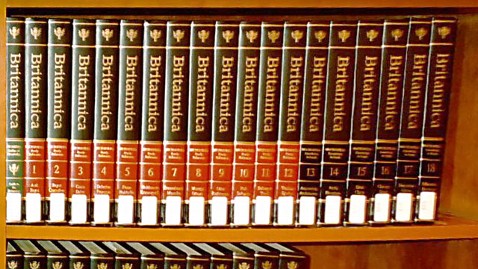I have one set of Encyclopedia Britannica in my classroom and another at home. Bastions of learning, they hold at bay the ignorant and call forth the curious. Though their 32 volumes take up a lot of room on my shelves, they hold a valuable place. For 244 years Encyclopedia Britannica has been quietly gracing schools and homes around the world and has been used by millions for writing term papers, settling arguments, or for the plain joy of seeking knowledge from its huge pages.
On Tuesday, Encyclopedia Britannica announced that it would no longer be printing its encyclopedias, but will only be offering its thousands of articles through computer or iPad app. While I have nothing against the electronic versions, they can never replace the feel of the actual books as I grasp them carefully by the spine to take them off the shelf and open their covers to find the universe contained within. It is fitting that an early ad called Encyclopedia Britannica, “The Sum of Human Knowledge.”
As a child, a set of encyclopedias was quite an investment for my parents, but it was one of the best gifts they could ever give me and my siblings. Rare was the day when the set sat complete on the shelf. More often, the huge books were spread throughout the house wherever anyone needed to look up a fact. Just lying there the tomes were invitations to peruse and I would frequently forget what I had originally meant to look up, as I got lost in the joy of discovery as article after article seemed more interesting than the last.
Encyclopedia Britannica saw me safely though junior high and high school and well into college. When I started having kids, Encyclopedia Britannica began to put out its electronic edition on CD and I bought it, but it was like a one-night stand compared to the lasting marriage I had with the original. No thesis, lesson, or lecture seemed serious unless the Britannica’s were spread out around me like a miniature fortress.
But now all that is over. The grande dame of learning cannot compete with her younger and faster children. While I am not one of those Luddites who believes that Wikipedia is evil or that search engines are rotting our children’s brains, it is a sad sign of the times that an institution like the Encyclopedia Britannica is leaving the earthly realm for cyberspace. I’m glad my children got to flip though its thousands of pages on the road to imagination and discovery, but what about my grandchildren? Sure, there will be plenty of sets around for the next few years, but will they be used? More likely they will be given a dusty place of honor that will seldom or never feel the tug of a child’s hand as she drags it off the shelf. Too bad.

When I was growing up (long before the internet was even an idea) we always had copies of both the Encyclopedia Britannica and the World Book Encyclopedia. As with you any time a question came up we were off to the encyclopedia to look for the answer, and even though there is unlimited information on the web, we had a much greater chance of getting an accurate answer. The internet is wonderful in being able to access abundant information, but so much of it is biased or inaccurate. With the encyclopedia you had a pretty good chance at getting a sound honest answer. They were also wonderful for just randomly opening up and reading about whatever was on the page. It was always exciting unpacking the new books when the upgrades came along.
I also enjoy being able to physically pick up a book. I will never be one who does their pleasure reading off of electronic devices. Books are wonderful and the fact that more publishers and readers are moving away from them is distressing. I enjoy audio books while traveling, but as I relax just before bed every evening a real book is what I want in my hands.
Power to the People:
It is sad to say goodbye to the book version of the Encyclopedia Britannica indeed. I’ve been casually searching for a GOOD condition “Ninth Edition” offered at a reasonable price for years. The Ninth Edition contains old knowledge, before space age times and technologies.
Save Old Wise Ways, Sylvia )O(